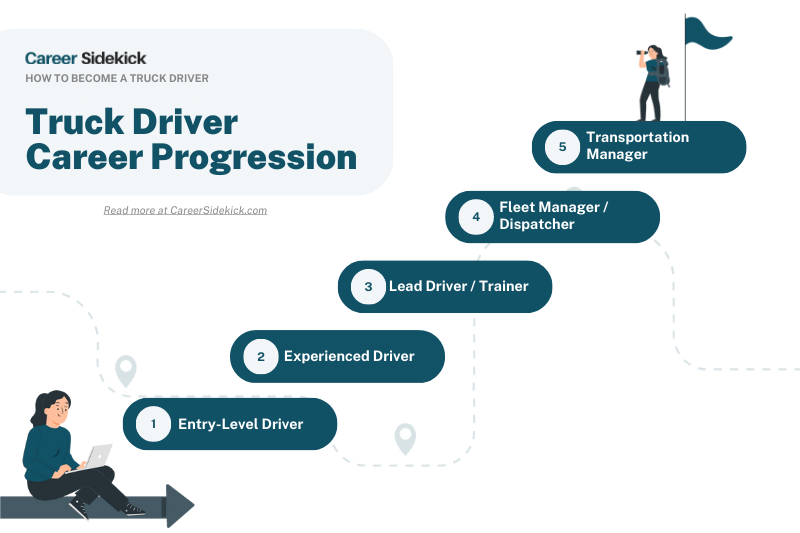At the venerable age of 60, the pursuit of a new career path might seem like an adventure reserved for the audacious. Yet, there exists a sector teeming with opportunity: truck driving. As the logistics and transportation industries burgeon, a pressing question arises: Is becoming a truck driver at age 60 a viable option for you? When contemplating this significant transition, one must explore various facets, from the evolving job market to health considerations and lifestyle adjustments.
First and foremost, let’s delve into the current demand for truck drivers. The transportation industry plays an integral role in our economy. With e-commerce flourishing, the need for capable drivers has surged. The American Trucking Associations has indicated a shortage of over 80,000 drivers—an alarming figure that underscores the urgency to bolster the workforce. This situation not only opens doors for new entrants but also emphasizes the experience and maturity that older drivers can bring to the table. After all, seasoned professionals often exhibit superior problem-solving skills and a stable temperament—traits that are invaluable on the road.
Nevertheless, one must ponder the inquiry: Are you physically prepared for the rigors of long-haul driving? The demands of this profession can be quite taxing on the body. Extended hours behind the wheel, coupled with irregular sleep patterns, may impact one’s overall health, particularly in the latter stages of life. It is essential to consider individual health conditions, mobility, and stamina. Older adults are often faced with unique challenges—perhaps hypertension, arthritis, or cardiovascular concerns. Therefore, consulting with a healthcare professional before embarking on this journey is not only prudent but imperative.
While physical readiness is crucial, the psychological component of such a lifestyle must also be scrutinized. The trucking lifestyle can be isolating. Long hours of solitude on the road may lead to feelings of loneliness or disconnection. Are you prepared to adapt to this potentially solitary existence? Alternatively, some may view this as an opportunity for introspection or even a chance to revisit personal passions through audiobooks or music. Understanding your psychological resilience will aid in determining whether this career choice aligns with your temperament.
Considering the operational aspects of truck driving also brings forth challenges and rewards. For instance, obtaining a Commercial Driver’s License (CDL) is a necessary step, involving both written examinations and practical driving tests. This process can be daunting, especially for those unfamiliar with the latest technology and regulations. However, most training programs cater specifically to older adults, ensuring they receive the guidance necessary to navigate these challenges. Many community colleges and vocational schools offer age-friendly programs, often focusing on safety and the nuances of contemporary trucking practices.
The allure of truck driving may also lie within the potential for financial gain. With competitive salaries, especially for long-haul drivers, many find the financial incentives compelling. The opportunity for increased profits comes at a time when retirement accounts may need bolstering. Furthermore, many trucking companies offer sign-on bonuses, competitive benefits, and flexible schedules. However, it’s essential to evaluate the reality of these earnings against the backdrop of expenses such as fuel, insurance, and maintenance. Establishing a detailed budget will provide clarity as you weigh this occupational choice.
Another pivotal consideration is the transformation within the trucking industry, particularly with the burgeoning integration of technology. The rise of automated driving and sophisticated tracking systems raises a pertinent question: Are you comfortable adapting to technological advancements? As the industry modernizes, truck drivers must now contend with ever-changing regulations related to electronic logging devices (ELDs) and GPS systems. While some view this as a hurdle, others embrace the chance to enhance their tech-savvy skills. Embracing this evolution may very well be the key to thriving within this profession.
Transportation is not merely a job; for many, it becomes a lifestyle. A successful transition requires not only a change in occupation but also an adjustment in daily life. Nomadic living often demands a rethinking of domestic arrangements. How can one maintain a connection with family and community while being perpetually on the move? Finding balance may involve scheduling regular home visits or investing in tools that facilitate communication, such as video calls. Establishing support networks with fellow drivers can also forge camaraderie, transforming isolation into shared experience.
In contemplating this career shift at age 60, it’s crucial to assess the compatibility of your values and aspirations with the truck driving lifestyle. Personal motivations vary widely; some individuals seek financial stability, while others crave adventure or a renewed sense of purpose. Harnessing these motivations can serve as a compelling driving force towards success in this new venture.
Before making a final decision, take time to reflect. Engage in thorough research, seek mentorship from seasoned truck drivers, and even consider shadowing a professional for a day. Understanding the ins and outs of the trade can illuminate aspects you may not have previously considered. This exploration will provide a robust framework for deciding whether transitioning to truck driving is not only possible but also rewarding.
Ultimately, at age 60, embarking on a career as a truck driver is a feat fraught with challenges and opportunities. While age may bring specific hurdles, it equally endows individuals with unique experiences and perspectives. So, the playful question you must answer is clear: Are you ready to navigate the open roads and embrace the journey ahead?
